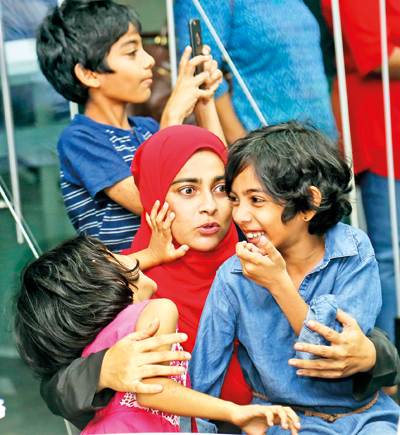‘We have to tell our stories- yours and mine’

Mom and writer: Zeneefa with her children at the Gratiaen Shortlist event. Pic by M.A. Pushpa Kumara
Zeneefa Zaneer is determined to remove the purdah- not a purdah drawn around a traditional woman- but one that secludes the Muslim community- one that has prevented them from simply coming out with their stories- very positive, vibrant life stories- sadly reducing them to stereotypes in the eyes of others.
Shortlisted for the Gratiaen Prize this year Zeneefa’s novel with Muslim characters, in manuscript form, They Failed to Kill Her, has a title inspired by the writings of the American pro-life activist Gianna Jessen, herself an abortion survivor who famously wrote that reverse of an epitaph for herself- ‘they failed to kill me’.
The book contains the story of Arzoo, a 15-year-old girl who did not die from attempts to abort her and was adopted by Jezeema, a labour nurse. Jezeema has an older son and all the travails of the lower-middle class housewife, while attending to Arzoo who has cerebral palsy as a result of the experience preceding her birth.
The Gratiaen judges were captured by a book with a “layered discussion of abortion, disability and its impact on women in particular, families in general, and the relationships that bind them all together”.
Zeneefa grew up on a staple of Sinhala and English books and she writes in both languages. Cutting across genres, she has penned novels, novelettes, short story collections, works of nonfiction and children’s picture books.
The biggest literary inspirations for Zeneefa have been Jodi Picoult and Khaled Hosseini- writers who address issues beyond comfortable sitting-room parleying – issues neglected by writers who crowd en masse to pick at more glamorous and exotic problems-ironically rare in real life. Disability has been a vivid thread running across all Zeneefa’s work. So has been abortion. But there is also domestic violence, consequent emotional breakdowns, and the largely looming question- Do we have the right to judge anyone else?
Growing up in the heart of a Kandyan Sinhalese community, Zeneefa as a girl rarely found Muslim characters in the books she read. If she did, they verged on the negative and were fed by stereotypes. This prompted Zeneefa to mould more rounded Muslim characters as her protagonists, which her Sinhala readers welcomed. Her books were not only a radical departure from the pink-hued romances that shared the shelves with them- but the world they evoked was also novel. Many of her Sinhala-reading fans would write to congratulate her on capturing a different ethnic group who co-existed in the same neighbourhoods yet different worlds.
A lot of research made its way into They Failed to Kill Her. Zeneefa had to fit into the world of a differently abled child. She was deeply inspired by a friend of hers- Irfan Hafiz. Afflicted by the rare Duchenne Muscular Dystrophy, Irfan used the only part of his body with strength- one index finger, to produce three books. Irfan, who lived to be 38, had a family who devoted themselves to him. Zeneefa also had friends with special needs children- including an Englishwoman who has three children with cerebral palsy. For her, such dedicated families are the truest heroes of our society.
Beneath an outspoken exterior, something her father inculcated in her, Zeneefa, who is petite and pretty, has very deep reserves of humanity. As she recounts her experiences, one sees that most of her writing had actually been prompted by the pain of empathy- chief among them the experience of seeing the differently abled, or others born with impediments, being ostracized by society. She believes everyone should be given the same fair chance.
A mother of three, Zeneefa juggles many roles. She is unfazed by the Herculean task of getting published which would have deterred someone fainter of heart. Her advice to the next generation of writers is to be on constant lookout for opportunities.
Speaking on behalf of the unheard and the misrepresented is a mantle she has taken upon herself. Whether it is the differently abled or the wide Muslim community or even the Tamil community, she has this strong zest to have those stories taken out of their boxes.
“You don’t have to wait for another person to make things better. You can do it. Each of us- we have a duty to do that. We have to tell our stories- yours and mine. If I read your story, if you read my story- then there’s room for understanding- to heal from division and hatred, and to live as one.”


